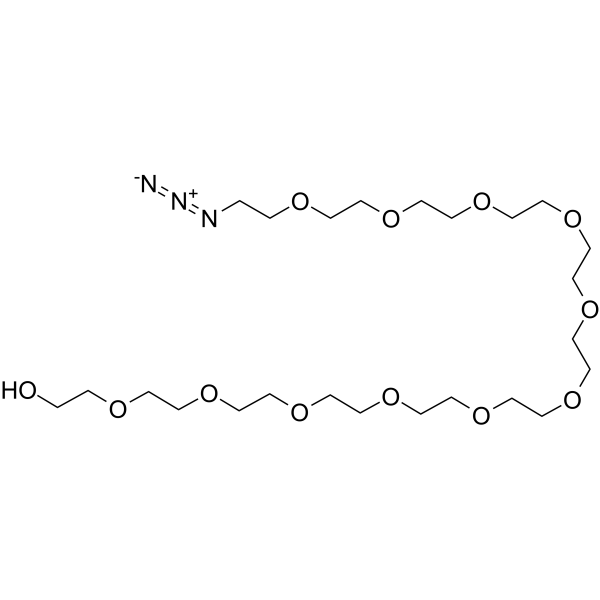
Azide-PEG12-alcohol
CAS No. 1821464-55-4
Azide-PEG12-alcohol( —— )
Catalog No. M26889 CAS No. 1821464-55-4
Azide-PEG12-alcohol is a PEG-based PROTAC linker that can be used in the synthesis of PROTACs.
Purity : >98% (HPLC)
 COA
COA
 Datasheet
Datasheet
 HNMR
HNMR
 HPLC
HPLC
 MSDS
MSDS
 Handing Instructions
Handing Instructions
| Size | Price / USD | Stock | Quantity |
| 25MG | 28 | In Stock |


|
| 50MG | 34 | In Stock |


|
| 100MG | Get Quote | In Stock |


|
| 200MG | Get Quote | In Stock |


|
| 500MG | Get Quote | In Stock |


|
| 1G | Get Quote | In Stock |


|
Biological Information
-
Product NameAzide-PEG12-alcohol
-
NoteResearch use only, not for human use.
-
Brief DescriptionAzide-PEG12-alcohol is a PEG-based PROTAC linker that can be used in the synthesis of PROTACs.
-
DescriptionAzide-PEG12-alcohol is a PEG-based PROTAC linker that can be used in the synthesis of PROTACs.(In Vitro):PROTACs contain two different ligands connected by a linker; one is a ligand for an E3 ubiquitin ligase and the other is for the target protein. PROTACs exploit the intracellular ubiquitin-proteasome system to selectively degrade target proteins.
-
In VitroPROTACs contain two different ligands connected by a linker; one is a ligand for an E3 ubiquitin ligase and the other is for the target protein. PROTACs exploit the intracellular ubiquitin-proteasome system to selectively degrade target proteins.
-
In Vivo——
-
Synonyms——
-
PathwayOthers
-
TargetOther Targets
-
RecptorS. aureus
-
Research Area——
-
Indication——
Chemical Information
-
CAS Number1821464-55-4
-
Formula Weight571.665
-
Molecular FormulaC24H49N3O12
-
Purity>98% (HPLC)
-
Solubility——
-
SMILESOCCOCCOCCOCCOCCOCCOCCOCCOCCOCCOCCOCCN=[N+]=[N-]
-
Chemical Name——
Shipping & Storage Information
-
Storage(-20℃)
-
ShippingWith Ice Pack
-
Stability≥ 2 years
Reference
1.SIERRA G, VERINGA HA. Effect of oxychlororaphin on the growth in vitro of Streptomyces species and some pathogenic fungi. Nature. 1958 Jul 26;182(4630):265.
molnova catalog



related products
-
2,3-dihydroxy-3-meth...
2,3-dihydroxy-3-methylbutanoic acid is a chemical compound.
-
Ianalumab
Ianalumab (VAY-736) is a decarboxylated humanized antibody against BAFF-R that inhibits the interaction between BAFF and BAFF-R, blocking BAFF-mediated apoptosis protection.
-
Chrysin 6-C-arabinos...
Chrysin 6-C-arabinoside 8-C-glucoside and chrysin-6-C-glucosyl-8-C-arabinoside are α±-glucosidase inhibitors, α±-glucosidase inhibitors are widely used in the treatment of type 2 diabetes.



 Cart
Cart
 sales@molnova.com
sales@molnova.com


